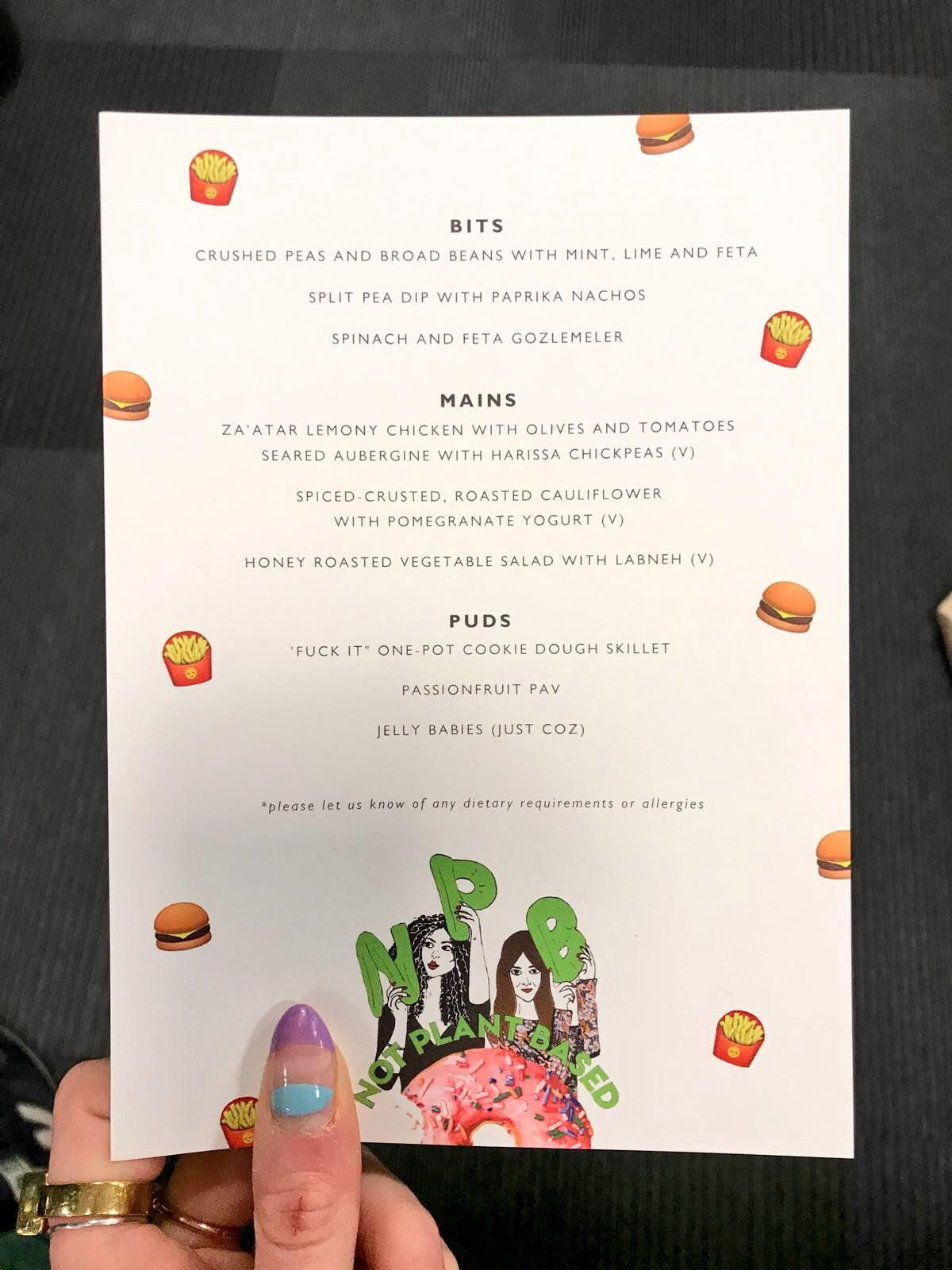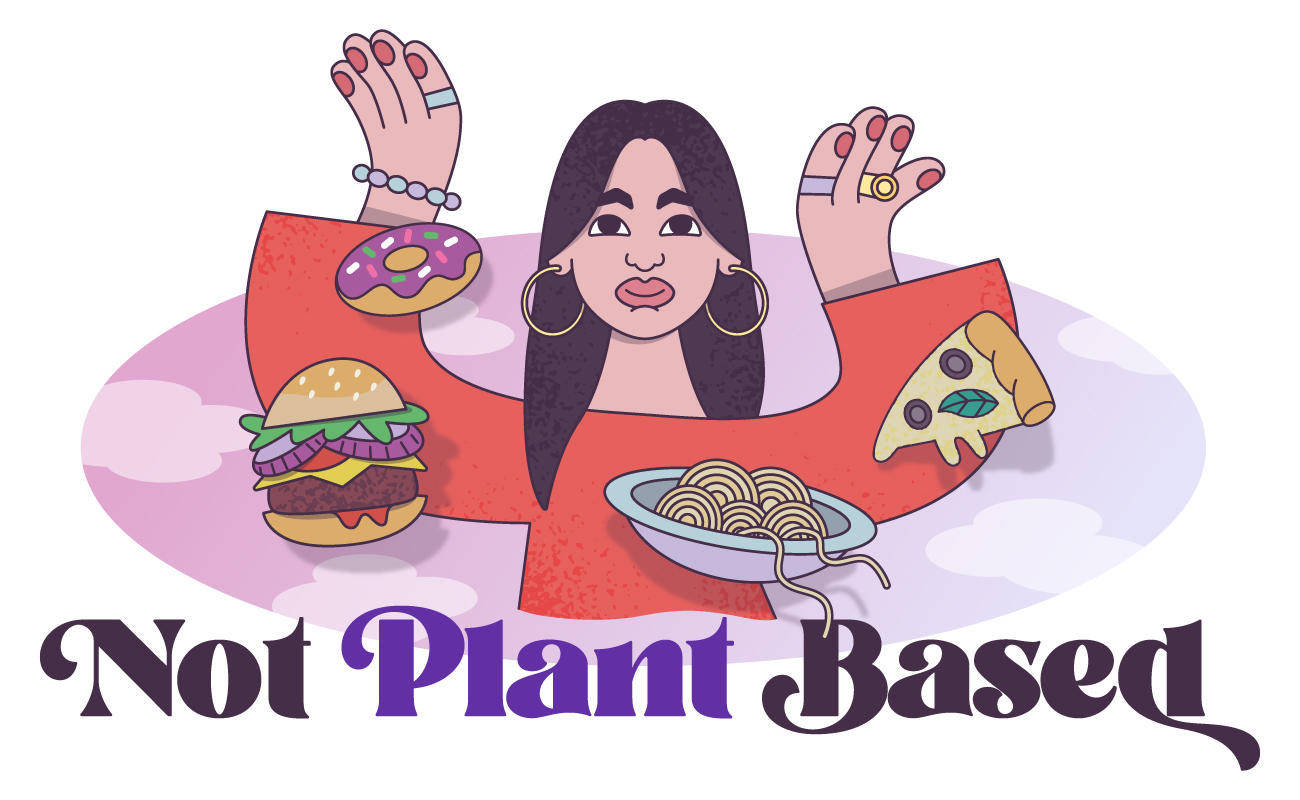
Last weekend I witnessed something magical. In an unassuming pop-up cafe somewhere between Peckham and ‘are we even in London anymore tho’, thirteen women (and one man) gathered together for the first ever Not Plant Based supper club.
The idea was one I’d been milling over for quite some time, initially hatched at our first birthday party in September thanks to one illuminating conversation. ‘I haven’t eaten cake in three years and this evening, thanks to this event, I felt like I could.’ Those were the words of one especially brave woman who was kind enough to approach us with her story which changed just about everything. From that moment, I became utterly convinced of the healing power of (delicious) food.
Fixing my starving body did teach me a thing or two about the potential for breakfast, lunch and dinner to heal me physically, but this was a novel revelation. Largely because I now knew that my theory would apply to both physical and mental health.
One thing that constantly troubled me during my eating disorder treatment was the atmospheric nervousness that circulated whenever anything edible was nearby. There were rules, regulations, constrictions – granted all designed to get us to eat more, but still rules nevertheless. What resulted was a predictable build up of terror; and a prescribed routine based on sustenance, calories and ‘fuel’; with pleasure, enjoyment and happiness cruelly neglected.
As a result, when treatment came to an inevitable end, patients continued to be locked in a relationship with food centred around rules, structure and functionality. Steering away from their routine with the introduction of a birthday barbecue or a three course meal would be hell on earth, and true freedom became ever more an impossibility.
And so, in a bid to buck the trend, any intervention I planned to action was always going to involve food. Announcing the idea of a supper club for people with eating disorders was nerve wracking to say the least. Would everyone think I was (even more) mental? Would anyone want to come? Would our readers think I was bullying them into eating? WHAT THE FUCK WOULD I COOK. Whilst I’m sure that a fair few did think I was mental – which incase you haven’t noticed, I’m fine with – the response was comforting to say the least.

Instagram comments and emails alike: women and men, as young as 16 and old as 60 (!) expressed their interest. Some were binge eaters, some restricters, others somewhere in between. A handful had been through some form of treatment and found themselves stuck halfway, while others had struggled to speak about their eating issues to anyone including their family.
In the following weeks, I prepped a menu brimming with enough flavours to keep things exciting whilst avoiding the intimidating plethora of choice. A mixture of both meat and vegetarian dishes – all of which I felt comfortable cooking (and eating) and was at least 75 per cent sure that I wouldn’t fuck up. Also, according to my tester (me) they are pretty fucking tasty which, of course, is most important. By the time the evening came around, I was sufficiently prepped (and sleep deprived), with chickpeas coming out of all orifices and sumac smeared all over my face. What better time to welcome 12 strangers into my temporary home!
The table was adorned with a care-home chic table cloth courtesy of the Peckham/Nunhead borders’ finest charity shops. Our wonderful friends at Papier provided beautiful printed menus, complete with the mandatory burger illustration, which weren’t available to view until guests arrived in order not to pander to the eating disorder bastard who needs to know the exact calorie content of every ingredient. Three plates of each dish were placed sporadically across the table; no intimidating, gargantuan portions or assigned individual platefuls. People could help themselves to however much – or little – they wanted. Oh, and it was bring your own booze because who the fuck has time to apply for an alcohol license these days? Also a toddler can pull a pint better than I can.

In they came, tentatively peering around the room at their fellow diners and perhaps wondering, ‘will eating with other people with eating disorders make me better, or worse?’
Within 20 minutes, it became clear that the age-old assumption of competitive restriction is totally mythical. You know, the expectation that if take a group of eating disorder patients out for dinner, girls will start shoving bits of chicken in their handbags to make sure they ‘win’ the prize of eating the least? Well, it’s a load of shit.
With thanks to a couple of very wonderful helpers by the names of Dave and Una, the gaggle of chatter began to build. Most sat happily next to a stranger (a few brought friends for support) and were instantly locked in the usual dinner party chit-chat; work, relationships, nights out – notably non-eating disorder related.
Overcome with FOMO, I left dessert preparation to brilliant boyfriend in the kitchen and took my place at the table for the main course. And thank god I did – it was magic. Thirteen women (and one man) engrossed in a passionate, sensitive conversation about all of the existential issues that underpin their mental health issue – with every single person speaking candidly about their own experience with the sole intention of helping others. Diet culture; Government public health messages; family pressures; cultural norms; Kayla fucking Itsines – we chewed over it all. And as the conversation thrived – and diners felt increasingly comfortable with the company – plates began to clear.

A small number of plates remained untouched throughout starters, as one or two girls struggled to grant themselves permission to follow my lead. By the time my cookie dough skillet came out of the oven, things were quite different. Intentionally, I’d left a plate of harissa chickpeas and some za’tar spiced chicken lingering throughout dessert – to cater for any sudden window of freedom. And low and behold, it worked. It took just under two hours for two of the particularly nervous women to eat anything, but as I gobbled up my last mouthful of cookie dough, they munched through a good amount of chicken, vegetables and – dare I say it – Jelly Babies (!) Most remarkably – and importantly – as they revelled in setting the world to rights with the rest of the group, they didn’t seem to be giving much thought to their mammoth challenge. In fact, they actually enjoyed eating. Two of the women told me later that night that it was the first time they’d eaten properly in weeks, and were shocked to discover that, despite what their family was telling them, there were plenty of others going through exactly the same thing.
Post-alcohol, women need far longer than three hours to satisfactorily conclude a conversation, so we retired to the pub down the road. Here, I heard of stories of doctors judging illness solely on the reading of the scales; and of women prescribed a starvation diet at the age of eight. For many, it was the first time they’d ever uttered anything to anyone about their food or exercise struggles. For others, it was the first time they’d experienced any therapeutic intervention that actually worked. For me, it was the first time that I realised that I – with zero relevant qualifications or clinical expertise – could really make a difference.

As I clambered aboard my Uber Pool, armed with Lidl bags full of left over Jelly Babies, the driver asked unknowingly if my night ‘had been a success’ (bit weird). ‘I think so,’ I muttered, before stopping myself immediately and giving Eve a big telling off for underplaying her achievements – as usual.
‘Actually,’ I said, ‘yes. Yes – a big success.’ And with that, I fished out a big handful of Jelly Babies and made my way through them on the ride home…
*If anyone would like to express an interest in the next supper club, please email notplantbased@gmail.com*
*Any suggestions/feedback is very welcome – we want to know what you want from your supper club, so please do tell us!*




How old do you have to be to go to these supper’s? 🙂
Author
there’s no lower age limit!